 Toutes les actualités (EN)
Toutes les actualités (EN) 
The burning issue of the world today is COVID-19 which lays its deadly hands on people across the countries indiscriminate of nationality, color, creed and religion. As corona deaths started increasing day-by-day, all nations-imposed quarantine and lockdown. India also imposed lockdown to fight out corona menace. However, imposing lockdown all of a sudden in a nation, where economic disparity is high, will create chaos only. Without an iota of concern about the hawkers, street vendors and petty traders and about the migrants, Tamil Nadu state government-imposed lockdown and it was like a bolt from the blue to the workers of unorganized sector.
As the entire Tamil Nadu shut down, the unorganized workers - majority of them are casual laborer’s - had no employment opportunities and no source of income. Later, Tamil Nadu state government announced a few packages of relief measures. But they were not truly helpful to the working population. It announced the distribution of Rs.1000 to every family card holder. Marginalized people, daily wage laborer’s and old people cannot make both ends meet with just thousand rupees at a time when price hike is soaring.
The instant the good hearts feel the situation, they voluntarily came forward to lending a helping hand by all means. When the government socially distanced itself from the reality and the poor people, individuals and social service organizations mobilized fund somehow and procured essential groceries and supplied them to the needy people. AREDS supplied a package essential grocery to the economically poor and handicapped at the grassroots level and to the migrants who were left alone on the streets in Karur district.
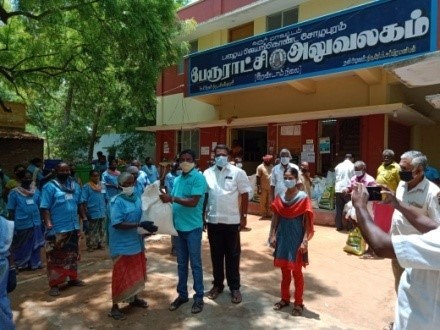
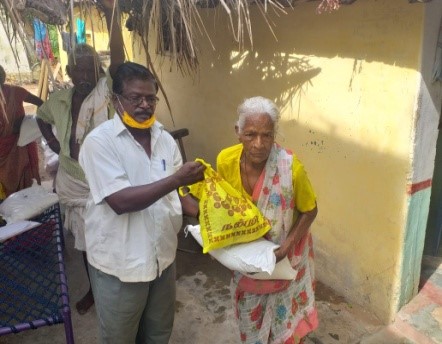
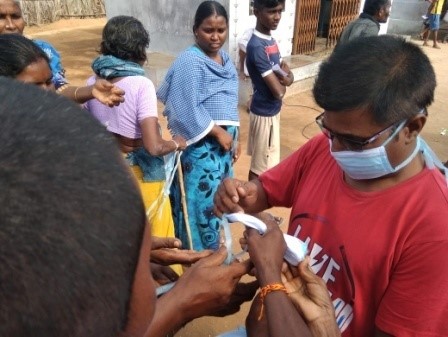
As soon as the government of India announced an ex-gratia amount of Rs.500 to poor, destitute and deserted women and widows, AREDS staff flung into action to see to it that the benefits reach the potential beneficiaries. On the one hand, we have been appealing to the PM and the government through letters to take proactive action to alleviate the misery of the unorganized workers and to ensure social protection to all; and on the other, we make full use of the government’s mission to help out the people, who are the most vulnerable in this time of lockdown. The people in solidarity with us in 20 districts helped the most deserving people get the ex-gratia amount disbursed by Tamil Nadu government.
The plight of migrants
Internal migration is common in India because of the mode of economy followed by the government. Relatively, as far as the socio-economic and cultural development is concerned, the southern states of India are better than the northern states. Though big industries, mega projects and major mines are being operated in the northern states, social condition, educational status are very poor there. Hence, unemployment crisis clubbed with illiteracy force the people to migrate to other states, the southern states in particular, in search of livelihood.
Since work force is available aplenty, the employers of host states hire people at low wages and exploit their labour power without any timeframe. Knowing that what they get as wages in other states is higher than what is paid in their native places, the migrants work without any resentment or complaints. Sometimes, they fall victim to the illegal measures of the greedy industrialists and realtors. In Chennai an eleven-storied building collapsed, killing nearly hundred migrant workers, while it was under construction violating the legal norms.
Generally, the migrant workers do not have valid identities like family card, adhar card and the like. As a result, they were certified as illegal immigrants and the claims of their wards or relatives are proved null and void on legal ground. Their situation becomes much worse in the time of natural disasters, communal violence and curfew imposed by the government.
Journey home amid lockdown
Indeed their condition was awfully pathetic during the lockdown period announced by the government for fighting against the corona virus. Blessed are those who owned houses to stay or who stayed in rented houses. When the city, towns and villages shut down, migrant workers were left alone in the streets. They had no options as they did not have any money with them. Many of them were not paid for the work they had done months before the industries, factories and foundries came to a halt. As they had no employment opportunities, many of them were thrown out their rented houses.
Hence, they were left with only option of going back to their native places. Unfortunately, the government has paralyzed the motor transports and train services. Reports say that several of them were caught by the police, booked false cases and put behind bars. As they had no legal permission to move out, they either could not stay in the far-off localities or could not go to their native places.
In Karur district also about 50 migrant workers were aspiring to go back to their native places. AREDS staff availed special passes for the migrant workers from the district administration and helped the migrant workers catch the special trains to reach out their respective places.
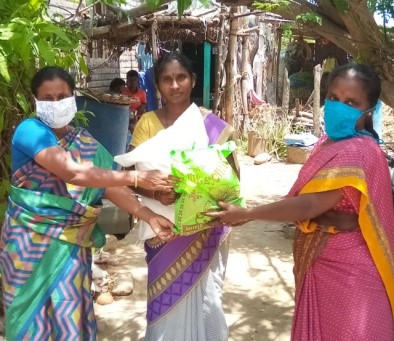
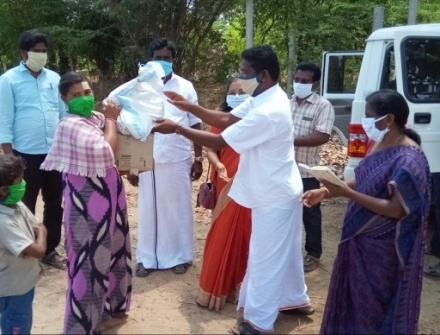
Bridging the producers and the consumers
Farmers had their produce harvested and kept them ready for sale. Consumers were expecting fresh arrival of vegetables and fruits to the selling outlets and to the market. However, during lockdown period, transport was absent and as a result, the movement of agricultural produce came to a standstill. With the relaxation made in the lockdown, the members of FPO (Farmer Producer Organization), promoted by AREDS in Karur district, collected the harvested produce and took them to the markets located in different localities. This way, the FPO members bridged the broken link between the producers and the consumers and restored the social transactions at the grassroots level. Now they realize the greatness of the farmers’ collective in the form of FPO in ensuring and continuing the humanity in the time of unexpected lockdown and social distancing.
This kind of human centered activities has been done by several people and organizations in different parts of Tamil Nadu state. But, accomplishing such activities, in the lockdown period, with a determination to move towards Human Economy is telling.
Contribution of our old interns from abroad
On hearing the lockdown, without further ado, some our students, who were here in AREDS as interns in 2010, from overseas took efforts in every possible ways, mobilized certain sum of money and sent it to us for extending our support to the needy people in the time of lockdown. It is not the quantum of money that matters. What was appreciable was their true concern about the downtrodden masses, who they know well when they were working with ten years ago, and the solidarity they extended. Hence, people around the world keep the Human Economy moving without any halt.
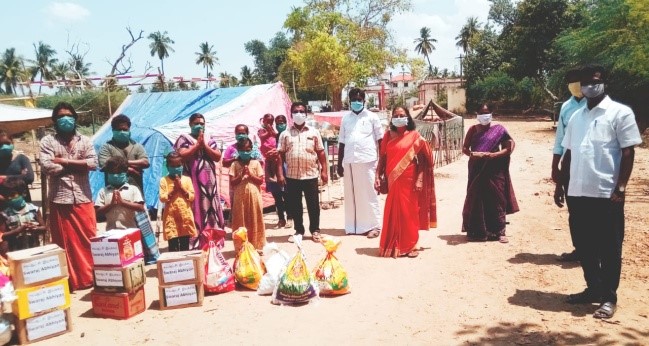
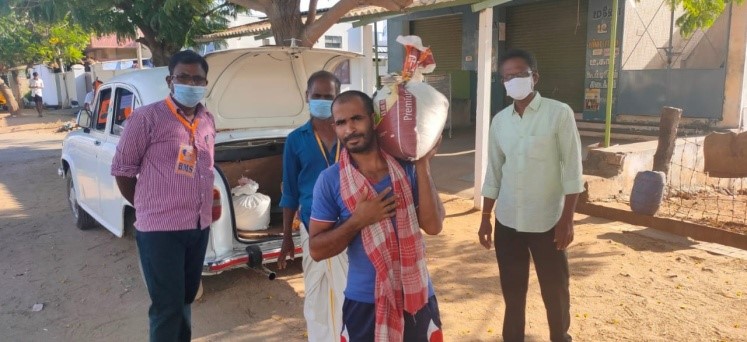
Lessons learnt
In any nation, people, who are socially and culturally connected, lead a healthier and happier life. This social bond is proved time and again whenever natural disasters strike. Though cyclone and flood devastate Chennai every year, the fraternal feeling and the social consciousness of the people remain intact and reinstated. Corona lockdown period also proved the greatness of humanity.
In the midst of social distancing imposed, people voluntarily helped the needy people by various means. As the manufacturing units, work places and trading centres have been closed down due to corona menace, people become unemployed – temporarily or permanently. To deal with the no-income situation, people have learnt many additional works and petty trades and earn money somehow.
As a definite and realistic strategy has not been followed by the government, majority of people are left in lurch and food availability is uncertain to them daily. It simply announced Rs 1000 per month as the lockdown relief fund to every family, with which people cannot make both ends meet. At the same time, the government did not fail to pay off the regular salary to the government employees. Ironically, those who are leading a comfortable life were also paid the relief fund Rs 1000. Migrant workers were completely ignored.
It is heartening to see the media and the labour unions, cutting across party lines, demand in one voice for the solution to the economic setback of the workers of unorganized sector, construction workers, domestic workers, street vendors, auto rickshaw drivers and sanitary workers in this lockdown period and in the long run.
Even in the time of lockdown and at the time of people undergoing social distancing, oppression against dalits, sexual violence on women and children and custodial killings take place on the one hand. On the other hand, the government is enacting anti-labour laws making use of the situation, when people could not come forward to protest en masse. However, people, irrespective of caste and religion, extend helping hands to safeguard the lives of millions of poor people, who have been ignored by the government at the time of dangerous pandemic disease strikes the world. Corona virus kills people but people escalate humanity for vying and surviving it.
INDIA AREDS TEAM / INHE ASIA
Ajouter un commentaire










